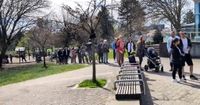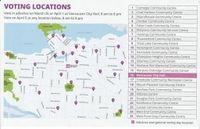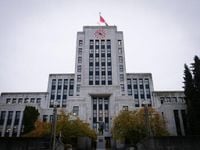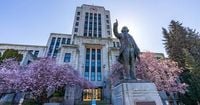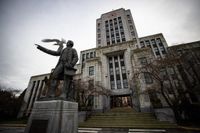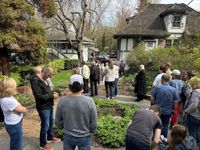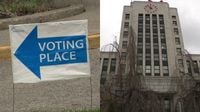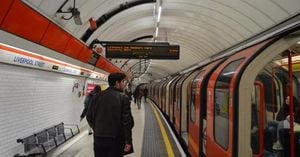Vancouver's elections office attributed long lineups at byelection voting stations on Saturday, April 5, 2025, to a record high voter turnout. Voters reported waiting in queues that lasted more than three hours, prompting the elections office to issue a statement asking for patience amidst the lengthy waits. This byelection, which aims to fill two vacant city council seats, has seen significantly higher voter turnout compared to previous byelections.
The elections office modeled this byelection based on data from the past two byelections, but the turnout has exceeded expectations. A polling station attendant at the West Point Grey Community Centre apologized for the hour-long lineup on Saturday afternoon, thanking voters for their patience as they entered the gymnasium, which had only four staff members checking IDs. The unexpected turnout led the office to add 45 staff members to assist with the anticipated crowd. However, even this increase was not enough to prevent long waits at some locations.
At the Mount Pleasant polling station, voters were so discouraged by the lengthy lines that staff suggested they try a different location. To mitigate the situation, the elections office sent additional tabulators to the busiest sites throughout the day to speed up processing. The lineup outside the Kitsilano Community Centre stretched for half a block, with some voters like Jay Lannon bracing for waits of over two hours. Lannon, who cancelled a yoga class to vote, expressed her dissatisfaction with the current municipal leadership, stating, "I’m not very impressed with Ken Sim’s leadership. I believe in a progressive society and don’t feel our current municipal government delivers on that."
Others, like Kent Linden, noted the unexpected turnout and shared their concerns about the Broadway plan, which proposes increased densification in the neighborhood. Linden remarked, "People are really annoyed at the Broadway plan. It just wasn’t put together properly." The elections office has also implemented a priority access line for voters with diverse access needs, including older adults and individuals with disabilities. Curbside voting is available for those unable to enter the polling station.
City officials expressed their appreciation for the community's commitment to participating in this democratic process, especially since byelections typically see low voter turnout. Vancouver's first day of advance voting on April 2, 2025, saw a remarkable 45 percent increase in votes cast compared to the first day of the last byelection in 2017. This surge in voter engagement has been a positive sign for the elections office.
In this rare two-seat byelection, Vancouverites are voting following the departure of OneCity Councillor Christine Boyle, who is now a B.C. NDP MLA, and Green Councillor Adriane Carr, who resigned to spend more time with her family. The byelection has drawn attention not only for its significance in filling council seats but also as a litmus test for Mayor Ken Sim's ABC party, which holds a majority on the council.
ABC is running two candidates: former Vancouver police veteran Ralph Kaisers and Jaime Stein, a former BC United candidate. The party's popularity has faced challenges since its sweeping victory in the 2022 elections, with some members, like Councillor Rebecca Bligh, leaving the party amid criticism of its handling of various issues.
The left-of-centre parties are also well represented in this byelection. COPE has Sean Orr as its candidate, while OneCity is represented by Lucy Maloney. The Green Party has Annette Reilly running to fill the seat left by Carr. The election has sparked discussions about various pressing issues, particularly around housing and urban development, which are at the forefront of voters' minds.
Many voters have expressed their frustration regarding the Broadway Plan, which proposes significant changes to the city’s landscape. Critics argue that the plan prioritizes high-density developments at the expense of community needs and local voices. This dissatisfaction could play a crucial role in determining the outcome of the byelection.
The elections office has been actively monitoring the lines and encouraging eligible voters to use the priority access line to ensure that everyone has the opportunity to cast their vote. The city’s commitment to facilitating voter participation has been evident, with additional resources allocated to manage the unexpected turnout.
As the day progresses, voters are encouraged to remain patient and persistent, with the polls set to close at 8 PM. The enthusiasm displayed by the community is a testament to the importance of civic engagement, especially in a time when many municipal elections have seen declining interest. The outcome of this byelection could signal a shift in the political landscape of Vancouver, particularly for Mayor Sim and the ABC party.
In the lead-up to the byelection, CityHallWatch has been active in providing information and analysis about the candidates and their platforms. The organization has highlighted the significance of this election as a rare opportunity for citizens to voice their opinions and influence the direction of local governance.
With voter turnout historically low in previous byelections, the current enthusiasm suggests a collective desire for change among Vancouverites. As the city faces pressing issues such as housing affordability, transportation, and urban planning, the results of this byelection will be closely watched by both supporters and opponents of the incumbent administration. The final tally will reveal how voters feel about the direction of their city and the effectiveness of their elected representatives.
In summary, the byelection on April 5, 2025, stands as a pivotal moment for Vancouver, with record-high voter turnout reflecting a community eager to engage in its democratic processes. As voters navigate the long lines and make their voices heard, the implications of their choices will resonate well beyond this election.
